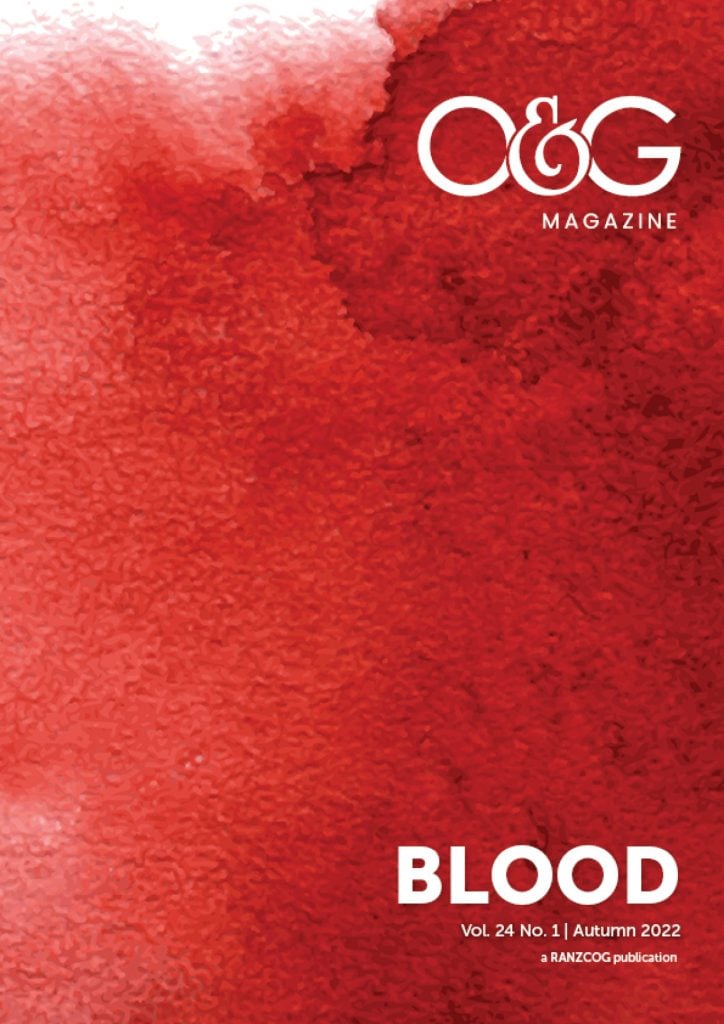The importance of clear and honest health communication has been highlighted during the Covid pandemic as we are faced with increasing online misinformation and a growing distrust of medical experts.
This article explores how a possible effect of the Covid vaccine on menstrual bleeding has intersected with the spread of online conspiracies and false information. It looks at women’s health research in an historical context, and how a combination of lack of data and a missed communication opportunity has resulted in an important lesson for women’s healthcare.
Misinformation regarding the Covid vaccine and women’s health began in 2020. False claims arose that the head of research at Pfizer believed the vaccines caused female sterilisation and that clinical trials should be stopped. The claim was thoroughly debunked. But for some, the damage had been done. Where previous surveys had not identified a gender difference, a large survey in the UK following the spread of this misinformation found the demographic most likely to refuse the vaccine were 18–34-year-old women, with many citing fertility as a primary concern.1
Online commentators began incorporating false claims of infertility into larger conspiracy theories centred around a corporate plot to sterilise and depopulate the earth and the ability of vaccines to act as a software platform to receive uploads.2
Whilst these increasingly bizarre theories spread online, there was a real phenomenon playing out in homes around the world. Thousands and thousands of women and menstruating people had noted a change in their next menstrual cycle after receiving the Covid vaccine.
Some reported a heavier period, some a delay in menstruation, and others noted new or breakthrough bleeding. Whilst people had been informed to expect possible fatigue, myalgia, fever or a sore arm following vaccination, no official sources had warned them to expect period changes.
What was going on? Whilst the anecdotes grew, official sources remained silent. It emerged that changes to menstruation following the vaccine had not been researched.3 Whilst trial participants had been questioned for myriad side effects, menstrual cycles changes were not included.
Predictably, the lack of official data on menstruation created a vacuum of knowledge that became a breeding ground for misinformation and conspiracy theories.
In April 2021, prominent author and anti-vaccine campaigner Naomi Wolf began sharing these stories on social media platforms, and linked the reports back to previously debunked associations with infertility, miscarriages and pregnancy complications. This narrative was picked up by other influencers, and fake or misleading news stories began to appear on clickbait type websites.2
Given reassuring fertility and pregnancy data did exist, there was a need for expert bodies to confidently dismiss these false claims. Concurrently, there was a need to balance reassurance with a frank recognition that any association with menstrual irregularity had not been studied. Perhaps there were concerns that nuanced communication and acknowledging a knowledge gap may be ‘playing into the hands’ of those seeking to discredit the vaccine.
RCOG’s initial statement in May of 2021 appeared, to many, to be sceptical of a possible association between period changes and the vaccine. Rather than querying a possible biological plausibility, and acknowledging the lack of any relevant data, the statement instead focused on other factors that may affect menstruation and noted that ‘the degree to which changing hormone levels will affect someone is often informed by her psychological wellbeing at that time. We know that life events can make PMS symptoms feel worse and something as all-consuming and life-changing as a global pandemic could result in women experiencing their periods differently’.4
In Australia, a physician and immunisation specialist told the ABC’s Corona Check in April that he was sceptical of anecdotes that were spreading via social media because individual experiences could be shaped by stress, anxiety and other factors.5
The initial response of experts; to attribute reported menstrual changes to psychology and stress, despite the fact that researchers had failed to collect relevant data, were interpreted by some as dismissive and condescending,6 with some commentators feeling that the response was an example of gaslighting of women’s experience of their bodies.7
It is timely to pause here to reflect on the historical context of women’s health research. Medicine has, until very recently, been practiced exclusively by men. The illnesses or processes that relate to female bodies – female genitals, menstruation, pregnancy, and the menopause – have historically been viewed as unimportant at best, or suspicious and inherently inferior at worst.
History is full of examples in the way in which women’s health has been considered ‘other’ or viewed as simply reproductive bodies with hysterical tendencies.8 Failing to include women at all in many older research trials means the effect of many common treatments and medications on the menstrual cycle and the female body remain unknown. When female predominant symptoms such as pelvic pain or menstrual abnormalities are recognised, explanations are often cloaked in emotional and psychological language, in a way that is not commonly applied to male bodies.9
Fast forwarding now to the second half of 2021, a few months into the vaccine roll out, and the trickle of individual reports had morphed into something much larger and harder to dismiss. By August 2021, two researchers in the US had collected over 140 000 self-reports from women who had noticed a change in their periods following vaccination.10 By September, the UK medicines regulation agency’s ‘yellow card surveillance’ program, the equivalent of the Therapeutic Goods Administration for adverse drug events reporting in Australia, had received over 30 000 self-reported notifications for menstrual changes following the vaccine.11
Whilst these reports were not evidence of a definitive link, and occurred in the setting of millions of doses of vaccine administered, it was nonetheless significant enough for the BMJ to issue an editorial in September stating that the link was plausible and should be investigated.12
The BMJ editorial noted that biologically plausible mechanisms existed that could explain a possible association. These included an immune response to the hormones that regulate menstruation, or an effect occurring in the immune cells in the endometrium itself, a theory supported by recent research out of Yale in the US that immune cells play a role in both building up and breaking down the uterine lining during a cycle.13
Menstrual changes have been reported after both types of Covid vaccines suggesting that, if there is a connection, it is likely to be a result of the immune response, rather than a specific vaccine component itself.14 Furthermore, precedent existed. Menstrual changes following vaccination have been demonstrated following large scale studies of the HPV vaccine.15
Alongside the BMJ editorial, RCOG also released an updated statement.16 This time there was less emphasis on pandemic stress and emotional wellbeing and more on the possible biological mechanisms of any possible link and the need to determine any possible association. The tone had shifted.
In the setting of millions of worldwide deaths from the global pandemic, both speed and safety in vaccine development were essential. A large number of vaccine side effects were investigated and tracked, and the general public was notified and prepared for these possible risks. There is no doubt that vaccine development has been overwhelmingly successful, with incredibly safe and effective vaccines developed.
It is nonetheless unfortunate that the effect on menstruation was not included in this initial information gathering. The resulting absence of data to address any menstrual concerns as they arose, and an initial willingness to dismiss an association, was fertile ground for breeding misinformation and distrust. The result likely contributed to the reluctance on the part of some to participate in this crucial public health initiative.
Time and research will determine whether a link between the Covid vaccine and menstrual irregularity does exist. There are currently several research projects under way and some early findings from retrospective data published in Obstetrics and Gynaecology in January of 2022 have demonstrated an association with transiently altered cycle length.17
If an association does exist, it is not likely that this information would have altered the decision for many women regarding vaccine uptake. Short-term menstrual irregularity, whilst important, is not life-threatening and, if any link is proven, appears to be short lived, self resolving, and has reassuringly not resulted in any changes in fertility or pregnancy outcomes. It is much more likely that this information would have been used simply to prepare and to reassure.
Unfortunately, the lack of any useful data has elevated this possible association from one of a dot point in a list of possible side effects, to a conduit for misinformation and a sense of condescension and dismissal for some women.
And so, whilst it is tempting to lay the blame completely on the toxic nature of social media and internet discourse, and the algorithms that allow false information to propagate, we must also acknowledge the contribution of our willingness to dismiss the lived experience of women as relating predominantly to emotion or perception, whilst concurrently failing to adequately investigate any association or biological mechanism.
As in all scientific research, the information that we find will only relate to the questions that we ask, and to the concerns that we take seriously.
We must acknowledge this important lesson and ensure that the effects of any medication or medical interventions on menstruation are not merely an afterthought in future research.
Our feature articles represent the views of our authors and do not necessarily represent the views of the Royal Australian and New Zealand College of Obstetricians and Gynaecologists (RANZCOG), who publish O&G Magazine. While we make every effort to ensure that the information we share is accurate, we welcome any comments, suggestions or correction of errors in our comments section below, or by emailing the editor at [email protected].
References
- Speed B. Coronovirus latest: Young women are the unlikely new face of vaccine resistance. 2021. Available from: https://inews.co.uk/news/health/coronavirus-latest-experts-debunk-vaccine-fertility-myths-women-819783
- Brumfiel G. The life cycle of a Covid-19 Vaccine lie. 2021. Available from: www.npr.org/sections/health-shots/2021/07/20/1016912079/the-life-cycle-of-a-covid-19-vaccine-lie
- Speed B. Coronovirus latest: Young women are the unlikely new face of vaccine resistance. 2021. Available from: https://inews.co.uk/news/health/coronavirus-latest-experts-debunk-vaccine-fertility-myths-women-819783
- Ward S. Royal College of Obstetrics and Gynaecology statement. 2021. Available from: www.rcog.org.uk/en/news/rcog-responds-to-reports-that-covid-19-vaccine-affects-periods/
- Wood N. Corona-Check ABC News Article. 2021. Available from: www.abc.net.au/news/2021-04-30/coronacheck-menstruation-periods-vaccines-misinformation-facts/100099778
- Mahdawi A. Who says it’s no big deal if the Covid vaccine temporarily disrupts menstrual cycles? 2021. Available from: www.theguardian.com/commentisfree/2021/sep/18/covid-vaccine-changes-menstrual-cycles
- Griffin A. Maybe it’s Moderna, Maybe It’s Menopause. The Cut. 2021. Available from: www.google.com/amp/s/www.thecut.com/amp/2021/09/covid-19-vaccine-affect-menstruation-periods.html
- Young K, Fisher J, Kirkman M. “Do mad people get endo or does endo make you mad?”: Clinicians’ discursive constructions of Medicine and women with endometriosis. Feminism and Psychology. Vol 29 Issue 3. Pg 337-356.
- Jackson, G. Pain and Prejudice. A Call to Arms for Women and their Bodies. United Kingdom. Little Brown Book group. 2019.
-
Brumfiel, G. Why Reports Of Menstrual Changes After COVID Vaccine Are Tough To Study. 2021 Aug. [Cited 2022 Jan]. Available from: https://www.npr.org/sections/health-shots/2021/08/09/1024190379/covid-vaccine-period-menstrual-cycle-research
- RCOG Statement. RCOG / FSRH responds to reports of 30000 women’s periods affected after covid 19 vaccine. [Cited 2022 Jan]. Available from: https://www.rcog.org.uk/en/news/rcogfsrh-responds-to-reports-of-30000-womens-periods-affected-after-covid-19-vaccine/
- Male, V. Menstrual changes after covid-19 vaccination. BMJ 2021;374:n2211 Available from: https://www.bmj.com/content/374/bmj.n2211
- Lu-Culligan A, Epstein RH. No, we don’t know if vaccines change your period. The New York Times. 2021 Apr. [Cited 2022 Jan]. Available from: https://www.nytimes.com/2021/04/20/opinion/coronavirus-vaccines-menstruation-periods.html
- Male, V. Menstrual changes after covid-19 vaccination. BMJ 2021;374:n2211 Available from: https://www.bmj.com/content/374/bmj.n2211
- Suzuki S, Hosono A. No association between HPV vaccine and reported post-vaccination symptoms in Japanese young women: Results of the Nagoya study. Papillomavirus Res2018;5:96-103.
- RCOG Statement. RCOG / FSRH responds to reports of 30000 women’s periods affected after covid 19 vaccine. [Cited 2022 Jan]. Available from: https://www.rcog.org.uk/en/news/rcogfsrh-responds-to-reports-of-30000-womens-periods-affected-after-covid-19-vaccine/
- Edelman A, Boniface ER, Benhar E et al. Association Between Menstrual Cycle Length and Coronavirus Disease 2019 (COVID-19) Vaccination. Obstetrics & Gynecology: January 5, 2022 – Volume – Issue – 10





Leave a Reply